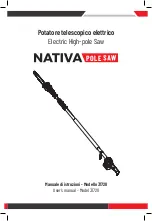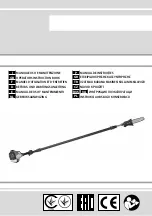
26
GB
• Blades that are misshapen or damaged in any way
must not be used.
• If the table insert is worn, replace it.
• Never operate the machine if either the door pro-
tecting the blade or the detachable safety device
are open.
• Ensure that the choice of blade and the selected
speed are suitable for the material to be cut.
• Do not begin cleaning the blade until it has come
to a complete standstill.
• For straight cuts of small workpieces against the
longitudinal limit stop the push stick has to be
used.
• The bandsaw blade guard should be in its lowest
position close to the bench during transport.
• For miter cuts when the table is tilted, the paral-
lel stop must be positioned on the lower part of
the table.
• When cutting round timber, use a suitable holding
device to prevent the workpiece turning.
• Never use guards to lift or transport items.
• Ensure that the bandsaw blade guards are used
and correctly adjusted.
• Keep your hands a safety distance away from the
bandsaw blade. Use a push stick for narrow cuts.
• The push stick has to be stored on the intended de-
vice, so that it can be reached from normal working
position and is always ready to be used.
In the normal operating position the operator is in
front of the machine.
m
Warning!
This electric tool generates an electro-
magnetic field during operation. This field can impair
active or passive medical implants under certain
conditions. In order to prevent the risk of serious or
deadly injuries, we recommend that persons with
medical implants consult with their physician and the
manufacturer of the medical implant prior to operat-
ing the electric tool.
Emergency procedure
Conduct a first-aid procedure adequate to the injury
and summon qualified medical attendance as quickly
as possible. Protect the injured person from further
harm and calm them down. For the sake of eventual
accident, in accordance with DIN 13164, a workplace
has to be fitted with a first-aid kit. It is essential to
replace any used material in the first-aid kit immedi
-
ately after it has been used. If you seek help, state
the following pieces of information:
1. Accident site
2. Accident type
3. Number of injured persons
4. Injury type(s)
6. Technical data
Electro motor
220 - 240 V ~, 50
Hz
Power
420W
(S1)
Revolutions
1400 min
-1
Saw band length
1790 mm
Saw band width
6 mm
Saw band width max.
13 mm
Saw band speed I
660 m/min
Saw band speed II
960 m/min
Cutting height
0 - 120 mm
Opening width
245 mm
Table size
300 x 300 mm
Slewing range of the table
0° bis 45°
Werkstückgröße max.
580x400x120 mm
Gewicht
28,5 kg
The work piece must have a minimum height of 3mm
and a minimum width of 10 mm.
The total noise values determined in accordance
with EN 61029.
sound pressure level L
pA
77,4 dB(A)
uncertainty K
pA
3 dB
sound power level L
WA
90,4 dB(A)
uncertainty K
WA
3 dB
Wear hearing protection.
The effects of noise can cause a loss of hearing.
Total vibration values (vector sum - three directions)
determined in accordance with EN 61029.
7. Remaining hazards
The machine has been built using modern technolo-
gy in accordance with recognized safety rules. Some
remaining hazards, however, may still exist.
•
Risk of injury for fingers and hands by the rotating
saw band due to improper handling of the work
piece.
• Risk of injury through the hurling work piece due
to improper handling, such as working without the
push stick.
• Risk of damaging your health due to wood dust and
wood chips. Wear personal protective cloth such
as goggles. Use a fitting dust extractor.
• Risk of injury due to defective saw band. Regu-
larely check saw band for such defects.
•
Risk of injury for fingers and hands while changing
saw band. Wear proper gloves.
• Risk of injury due to starting saw band while
switching on the machine.
• The use of incorrect or damaged mains cables can
lead to injuries caused by electricity.
•
Wear only closefitting clothes. Remove rings,
bracelets and other jewelry.
Summary of Contents for 5901505850
Page 2: ......
Page 5: ...Fig 9 1 Fig 9 1 Fig 10 Fig 8 1 Fig 9 Fig 11 k o M L Q 8 N J 11 Fig 7 3 Fig 7 4 Fig 8 P k 5 d...
Page 7: ...Fig 15 Fig 16 Fig 17 e e Fig 18 g f g e g f g e h h i i j R o m l 14 n k...
Page 8: ...Fig A Fig B Fig D Fig C...
Page 45: ...45 R1 R2 C K2 K2 K1 S 230 240V A10...
Page 46: ...46...
















































